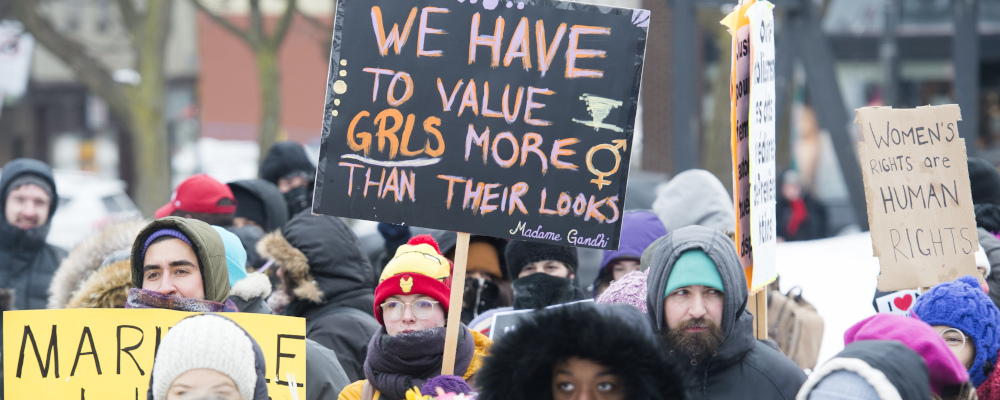Today is International Women’s Day and this year I want to highlight a compilation of the under-discussed issues that impact women across the world but that do not get the same shine as some other high-profile topics.
Keep in mind, this is not an exhaustive list that encapsulates every issue that impacts women. It is a partial look intended to broaden the conversation that typically takes place on days like today.
Voting and politics in Canada
The fight for women’s participation in the public square was not an easy fight. Since winning the right to vote on the federal level in 1918 and the right to be a parliamentarian in the House of Commons a year after that—followed by the abolishing of remaining voting restrictions throughout the 20th century—women in Canada have been voting in elections at steadily high rates. While overall voter turnout was a bit lower compared to the previous election, during the 2021 federal election, women under 65 participated at a higher rate (63.8 percent) than men (60.6 percent).
One major breakthrough was seen during the 2021 federal election when 43 percent of candidates across the five major parties were female and gender-diverse candidates. There were 103 female members of Parliament elected, accounting for 30.5 percent of Parliamentary seats. Not only is that the highest number in Canadian political history, but it is well above the global average of 26.1 percent.
Now, before we toot our horn here, while this is a major win, many Canadian women are still apprehensive to run and become full participants in our government. We should not be satisfied with where that number sits. There are still challenges that women in politics face, from media coverage, online harassment, and socioeconomic barriers raising funds, to overall sexism and double standards that consistently plague women in positions of power.
Data and technology
Despite women accounting for about half of the world’s population, there is a data bias that favours men. As explained by Caroline Criado Perez’s book Invisible Women: Data Bias Designed for Men, the default data perspective in any industry, including the sciences, is male-centric.
The lack of sex-disaggregated data has negative consequences, even fatal ones. Take this one case study: car safety equipment, including airbags, seatbelts, and headrests. Test dummies are calibrated to approximate the 50th percentile male. Consequently, the safety equipment tested on these dummies does not account for women’s physiological composition. As a result, women are 47 percent more likely to be seriously injured than a man in a car crash and 17 percent more likely to die.
If data and science often ignore women, the opposite is too often true when it comes to emerging technologies. Frequently, the common real-world application of these tools is to target and victimize women.Due to the number of horrific reported cases of sexual assault by drivers to female passengers and drivers throughout the 2010s, Uber and other ride-sharing companies now permit passengers and drivers to share their location with friends and loved ones for safety purposes.
Case in point: the rise of deepfakes. Deepfakes are artificial images, videos, or audio that utilize machine learning to imitate someone’s likeness or voice. Now that they are reaching the point of convincing indistinguishability from reality, the societal consequences boggle the mind. They will be utilized to promote misinformation and disinformation by nefarious governments and actors the world over. But again, the first and most common victims of this technology are women. According to a study conducted by a cybersecurity firm, 90 percent of the deepfakes circulating online depict non-consensual porn that features women.
You do not have to be a high-profile public figure to be a target—with their increasing ease of use, these deepfakes are being used to shame, silence, and victimize women regardless of stature or status.
Reproductive health care
While the issues surrounding abortion and its access have understandably taken centre stage, two other areas surrounding female reproductive health are under-discussed in public policy conversations: maternal deaths and forced sterilization.
The good news is that globally, maternal deaths in childbirth have been declining. From 2000 to 2020, the global maternal mortality ratio declined by 34 percent. But while rates are overall low in Europe and North America, maternal deaths there have risen by 17 percent between 2016 to 2020.
In Canada, between 2000 to 2020, 523 women died from maternal deaths, according to Statistics Canada.Experts say that the number may be much higher since much is unknown about how many mothers died months after childbirth due to childbirth-related reasons. With better and more clear communication and a more robust maternal health monitoring system, many of these deaths could be prevented.

This issue will continue to grow in importance considering that women in Canada are having children at later ages when complications with pregnancy and birth are more prone to occur. As Canadian health care is at a crossroads, maternal health should be at the forefront of our discussions.
On the other end of the spectrum, forced sterilization unfortunately still occurs and is massively underreported, even in Canada and other Western societies.In 2020, ICE was accused of forcibly sterilizing migrant women who were being held in detention.
In fact, while the exact numbers are unclear, Indigenous women in Canada are still being forced or coerced into getting sterilized by unethical health practitioners to this day. As a result, Senate Bill S-250 aims to amend the criminal code to have the practice criminalized and punishable by 14 years in prison.On the bright side, public policy has been starting to positively address women’s reproductive health in other ways. Spain recently passed legislation where women can request a paid sick day if they’re having painful menstruation. For anyone who has had painful menstruation days or chronically suffers from endometriosis, this is music to their ears. Canada should follow suit.
Conflict and diplomacy
War and conflict is a major threat-multiplier. Not only does it contribute to mass violence and threatens general security, but it is also a stressor that exacerbates pre-existing gender-related social problems and concerns.
About 3.6 million people in Ukraine are estimated to need gender-based violence prevention and response in 2023, the vast majority of them being women and girls. That number continues to rise. Systematic sexual violence against women and girls of all ages has been used as a weapon of war. Due to stigma, the numbers of victims and survivors are still massively underreported.Despite these frightening realities, many Ukrainian women chose to remain and serve. More than 50,000 are currently serving the Ukrainian military, even in combat operations. Many others are participating in non-military roles, such as medics, and generally helping out whenever they can.
While the end of the war remains still out of sight, it is not too early to envision and plan for the eventual peacebuilding process. Research shows that from 1992 to 2019, women constituted, on average, a mere 13 percent of negotiators, 6 percent of mediators, and 6 percent of signatories in major peace processes around the world.
War affects us all. Not including a massive portion of the population in these peacebuilding endeavours is bad policymaking.More research shows that when peace negotiations are done by the few, and primarily by men, 50 percent of them break down within the next five years. When women’s organizations and general civil society groups are actively consulted and included, a peace agreement is 64 percent less likely to fail.
Though not without its challenges, there is an example we can look upon. Post the 1994 genocide, Rwandan women have been very active in the rebuilding process in the short and long term. Consequently, though not without its challenges, Rwanda has seen major improvements politically, legally, socially, and in its security. At present, female MPs represent 61.25 percent of Rwanda’s national parliament, over double Canada’s proportion of female MPs.
There has been massive progress made in gender equality. We should not take for granted the gains we have made in so many areas. But there is much work still to be done, and we should not let our attention be monopolized by a few high-profile issues when it comes to women’s empowerment.
There is perhaps no better place to be a woman in all of the world than Canada, thanks in large measure to the many women who lived and came before us and who took on the challenge to fight for their rights. They did it before, and we can do it again now. And not just for the sake of women, but for the betterment of all society—we are all better off when each and every one of us is able and encouraged to maximize our full potential and build a better Canada, and world, for all.
Recommended for You

‘We’re twisting in the wind’: The Roundtable on Carney’s concerning lack of strategy in Canada-U.S. trade talks

‘A weaponization of the bureaucratic process’: Should a controversial Christian rocker have had his concerts cancelled?

‘Multipolarity is upon us’: Report shows American protectionism will cause global turmoil and China’s rise

Julia Blackburn: Strengthening Canada’s future through evidence-driven programs




